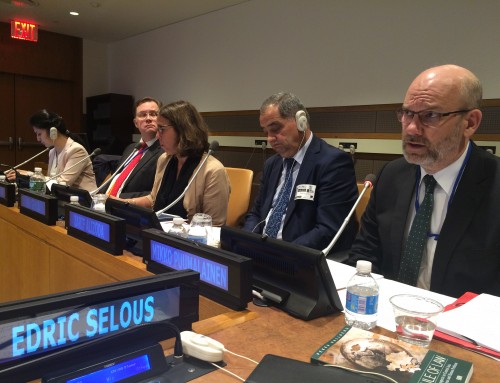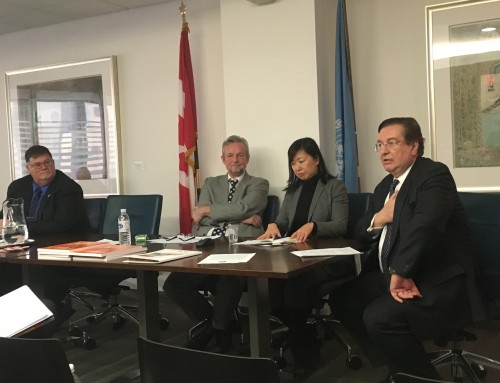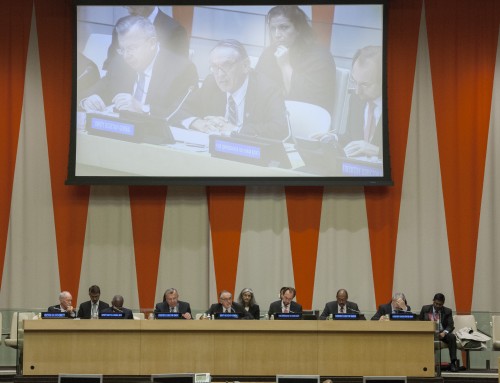The Permanent Missions of Italy, Mexico and Turkey to the United Nations, and the Rule of Law Unit on behalf of the UN Rule of Law Coordination and Resource Group (ROLCRG), organised a panel discussion on “E-justice: sharing national experiences in enhancing transparency, effectiveness and access to justice” in New York on 1 June 2016.
The event provided an opportunity for Member States to exchange knowledge and national experiences on strengthening the rule of law through e-justice, in particular by enhancing the effectiveness and transparency of and access to justice institutions.
A few important key themes emerged from the discussion. All three presenters noted how e-justice has provided significant financial and time savings, thereby enhancing the effectiveness of the proceedings and timely delivery of justice. Some of the common challenges mentioned included ensuring the needed validation and authentication of information, as well as data security. At the same time, easier access to information and thereby the transparency of the judicial system has not only been important in itself, but it has also increased the quality of justice. The access to monitor the advancement of proceedings, good quality legal databases, and the availability of public versions of judgements has also provided an opportunity for public awareness and scrutiny, enhancing the accountability of the whole judicial system. This has created a shift in the expectations of the public, in particular of young people.
Furthermore, different applications designed to facilitate and monitor case management and the operation of all parts of the judicial system have helped Governments in planning the use of resources more strategically, preventing bottlenecks and ensuring accountability of individual employees. They have also simplified the gathering of statistical information and measurement of progress and results.
Summary of presentations and discussion
Mr. Edric Selous, Director of the Rule of Law Unit in the Executive Office of the Secretary-General, opened the event placing it in the context of a series of events aimed at facilitating exchange of national practices to strengthen the rule of law. The event series responds to a call of the General Assembly in its annual resolution on the rule of law at the national and international levels for increased sharing of national experiences and dialogue amongst various stakeholders, as well as for a follow up to the voluntary pledges made on the occasion of the High Level Meeting on the Rule of Law in 2012. This event, organised by the Rule of Law Unit on behalf of the UN’s Rule of Law Coordination and Resource Group, follows similar events that have focussed on legal aid, birth registration, prison reform and ombudsman institutions.
Judge Servet Gul, Head of the Department of Information Technologies of the Ministry of Justice of Turkey, drew on his extensive experience on developing the national e-judiciary system in use in Turkey, called UYAP. UYAP, which won the UN’s Public Service Award in 2012, has significantly increased the effectiveness and accessibility of the judicial system in Turkey, by providing faster, more transparent and more cost efficient judicial services than ever before. UYAP links together all judicial institutions in Turkey and it provides the possibility for the whole judicial process to be carried out through an electronic document flow. The system currently has 1.9 million users, and it has resulted in annual savings of approximately 100 million USD, as well as significant environmental benefits, as it allows for a virtually paperless working environment. UYAP is complemented by an advanced video-conferencing service, which allows for testimony and hearings to be carried out at distance, without having to transfer prisoners and detainees to court. In addition the Ministry of Justice of Turkey is currently working on several projects aimed at further enhancing the e-justice system. These include the development of a registered e-mail, a law enforcement portal, a forensic data bank, as well as e-sales, e-lien and e-teller portals.
Dr. Pasquale Liccardo, Director General of the Directorate of Automated Information Systems of the Ministry of Justice of Italy presented the “On-line Civil Trial” process of Italy, which is the largest e-government project undertaken by Italy and has the coverage of all civil cases throughout the country. The system allows for an entirely electronic processing of cases, which significantly reduces the time and expenses related to accessing the court. It integrates several high-security features, including a two-stage authentication, digital signature, and certified emails. The system has 6 million daily users and it has not only resulted in annual savings of 55 million EUR, but it has also increased by 25% the submission of legal acts to courts. The system is connected to the E-Codex system, providing interoperability within the European Union. Some of the lessons learnt in Italy have included the need for training, and for reorganisation of processes, as well as to ensure reliability in the access to documents. The Ministry of Justice of Italy was currently working on developing a portal for online auctions, as well as in extending the system to also cover criminal cases, the Supreme Court and the Justice of Peace Offices.
Mr. Juan Pablo Raigosa, member of the Judicial Council of the State of Nuevo Leon in Mexico, emphasized how the enhanced administration of justice through the use of ICT has resulted in significant improvements to the business and investment environment in the State of Nuevo Leon, which ranks very highly in particular in the enforcement of contracts. The “Virtual Tribunal”, the development of which started with the digitalization of civil files in 2002, has now reached a situation where 90% of all files are authorized in the virtual environment. The system is highly accessible, providing real-time information through a dedicated application, which can be accessed from anywhere in the world and also incorporates the possibility for searches. Like the UYAP system in Turkey, the Virtual Tribunal has a possibility for video-conferencing, significantly reducing the cost, time and security implications associated with transfers to the court. Virtual Tribunal has been found to minimize the chances for corruption, to speed up proceedings and to have capacity to handle more cases with fewer staff. The State of Nuevo Leon is currently engaged in developing “the mobile court officer” which allows all judicial staff to work from wherever they are, and for their workflow to be monitored. Furthermore, a dashboard has been developed to follow the workload of courts and give advance notification of possible delays or bottlenecks. This has permitted for a more strategic deployment of resources.
Mr. Jim McMillan from the National Center of the States Courts reflected on the issues raised in the presentations, noting first of all how ICT solutions have created an entirely different expectation from the part of the population and young people in particular regarding accessibility and transparency of information. This has not been without its tensions between the public, politicians and public officials. Nevertheless, e-justice solutions have shown their usefulness and can be used both in civil and common law countries and in countries with very different levels of development. Mr. McMillan agreed with the presenters that validation and authentication of information is a significant challenge, but noted that all three institutions presented had found solutions to it and could also offer their lessons learnt to others. A useful feature of e-systems was also the possibility to better measure results and productivity, and of particular interest was the dashboard developed by the State of Nuevo Leon, as it allowed for the statistical information gained to be used in forward-looking planning. In addition to transparency and accessibility, e-justice systems had also enhanced the quality of justice, of the application of laws and of sentencing, through an increased possibility for comparing and studying precedents.
In the discussion which followed it was noted that the systems had common features and there was a willingness to ensure that the lessons learnt would be transferred as best as possible. The representative of the Republic of Korea briefly introduced their internet-based system, which provides an entirely paperless process and integrates all actors in the justice system, and has served to enhance transparency, effectiveness and access to justice. It was noted that the efforts to improve e-justice were beneficial to decrease inequalities, as well as to attain the Sustainable Development Goals. The representative of the International Development Law Organisation noted how both, the use of ICT, and the law, were integral to the whole of the sustainable development agenda and provided important tools to enhance trust in public institutions, as well as to follow up on the implementation of Agenda 2030. The representative of UNODC briefly introduced the e-learning programmes provided by UNODC, which have allowed the organisation to also bring modern tools of e-justice to remote and conflict-affected places.












